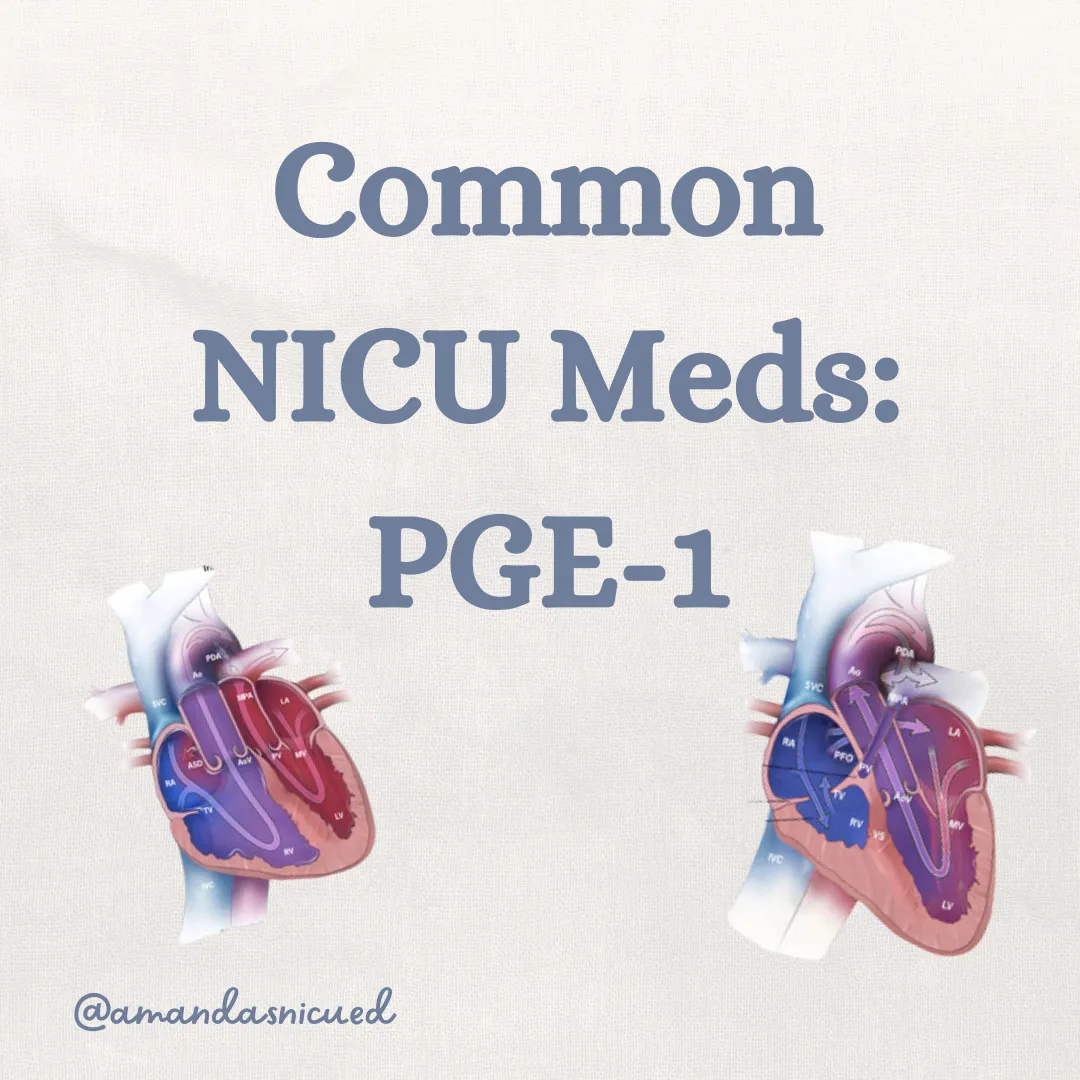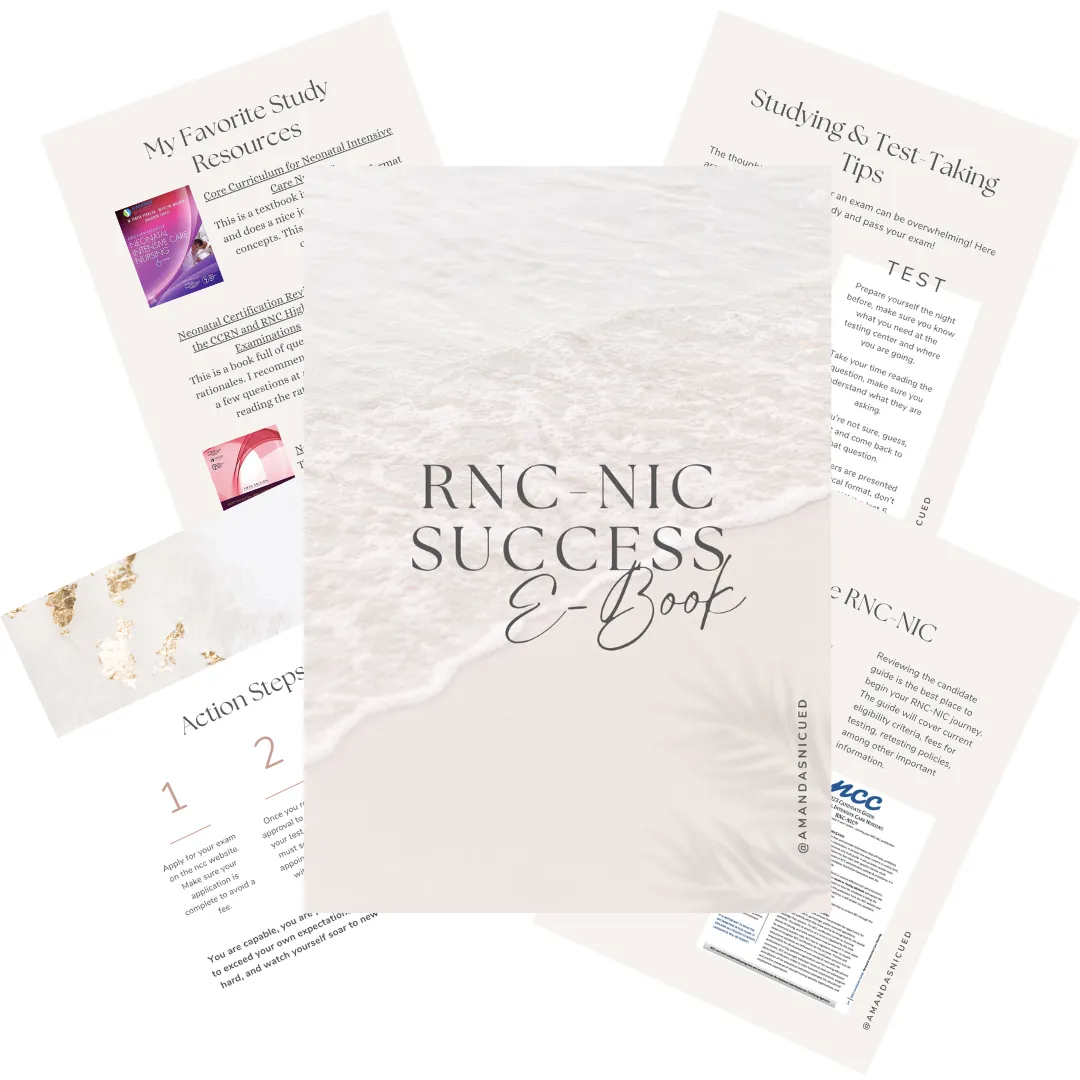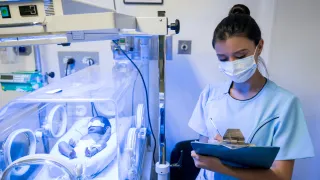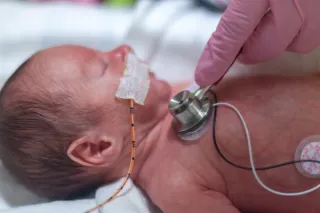
Welcome to Amanda's NICU Education




Hi! My name is Amanda. I'm a NICU nurse, Clinical Nurse Specialist, NICU Educator... basically your NICU BFF. If you want to talk NICU, I'm here for you! I love everything about NICU nursing and I'm eager to learn and share my knowledge with all my NICU friends.
I have been a NICU nurse since 2009 I am currently a Clinical Nurse Specialist in a Level IV NICU in Los Angeles.
I am passionate about educating the next generation of NICU nurses. I share my knowledge through platforms such as Instagram and Facebook and am excited to have you here on my website!
Click on the button below to sign up for my newsletter filled with NICU education and tips for all experience levels.

Not very many people love taking tests but as a self-acclaimed "forever student" who has taken (and passed) five different certification exams I am no longer afraid of tests! "Way to brag", you might be thinking but I want to help YOU pass your certification exam too!
Introducing Amanda's RNC-NIC Success digital course - your ultimate study companion!
Gain unlimited, on-demand access for life, ensuring you're primed to ace your certification exam.
I'm here to help you succeed and I can't wait for you to share with me that you PASSED the RNC-NIC EXAM!!!










Cyanotic Congenital Heart Disease and PGE-1
Cyanotic Congenital Heart Disease and PGE-1

Cyanotic congenital heart disease (CCHD) poses unique challenges in the neonatal intensive care unit (NICU). As NICU nurses, understanding the pathophysiology and appropriate management of CCHD is crucial for providing optimal care to these vulnerable infants. In this discussion, we will explore the role of Prostaglandin E1 (PGE-1) in the management of cyanotic congenital heart disease. We will discuss the mechanism of action, indications, administration, and nursing considerations.
Understanding Cyanotic Congenital Heart Disease:
Cyanotic congenital heart disease refers to a group of cardiac anomalies characterized by decreased oxygenation resulting in cyanosis. These conditions include Tetralogy of Fallot, Transposition of the Great Arteries, Tricuspid Atresia, Truncus Arteriosus, Total Anomalous Pulmonary Vascular Return, Hypoplastic Left Heart, and Pulmonary Atresia. Infants with CCHD require prompt evaluation, diagnosis, and management to optimize oxygenation and systemic perfusion.

What Is PGE-1:
Prostaglandin E1 is a naturally occurring hormone-like substance that plays a vital role in maintaining ductal patency during fetal life. In neonates with certain forms of CCHD, the ductus arteriosus fails to close, leading to improved oxygenation. PGE-1 acts as a vasodilator by relaxing smooth muscles, including those in the ductus arteriosus, thus maintaining or reopening the ductus arteriosus and allowing for adequate pulmonary blood flow.
Indications for PGE-1 Administration:
PGE-1 is indicated in infants with specific cyanotic congenital heart defects, such as Transposition of the Great Arteries or critical pulmonary or aortic stenosis, where the ductus arteriosus is crucial for systemic or pulmonary blood flow. PGE-1 helps ensure adequate mixing of oxygenated and deoxygenated blood and allows time for further diagnostic evaluation, stabilization, and appropriate interventions.
Administration of PGE-1 and Monitoring:

PGE-1 is typically administered as a continuous intravenous infusion. It requires careful dosing and monitoring due to its potent effects. The dosage is individualized based on the infant's weight, response, and the specific cardiac defect. Close monitoring of vital signs, oxygen saturation, and the infant's clinical status is essential during PGE-1 administration. Nurses play a crucial role in monitoring the infusion rate, maintaining a patent intravenous line, and promptly reporting any adverse reactions or changes in the infant's condition.
Potential Complications and Nursing Considerations:
While PGE-1 can be life-saving, it is not without risks and complications. Common side effects include apnea, fever, hypotension, and irritability. Nurses should closely monitor for these adverse effects and promptly report any changes. Additionally, vigilant infection control practices should be followed to reduce the risk of infection at the intravenous site. Careful assessment of the infant's renal and hepatic function is important, as PGE-1 metabolism occurs in these organs.
Collaboration and Communication:
Effective collaboration and communication among the healthcare team are vital in managing infants with CCHD and PGE-1 therapy. Nurses should work closely with the neonatologist, pediatric cardiologist, and other healthcare providers involved in the infant's care to ensure proper dosing, ongoing assessment, and evaluation of response to therapy. Open communication is key to addressing any concerns or questions and facilitating a multidisciplinary approach to
care.
As NICU nurses, understanding the use of PGE-1 in managing cyanotic congenital heart disease is essential for providing safe and effective care to infants with these conditions. By understanding the mechanism of action, indications, administration, potential complications, and nursing considerations of PGE-1, you can contribute to the holistic care of these vulnerable infants. Collaborative teamwork and ongoing education are vital in staying updated on the latest evidence-based practices in the management of CCHD.
WANT MORE FREE TIPS FROM ME?
Sign up for my free course. Click on the image below


December 2023 Certification Review Webinar
NICU Certification Review



Ready to kickstart your journey to becoming a certified NICU nurse?
Look no further!
Grab my FREE E-Book packed with essential study and test-taking strategies for the RNC-NIC.
In the E-Book I give you the resources you need including the link to access the candidate guide, several types of books to study from, some of my favorite strategies, an outline of the content you should review, and a blank calendar for you to make your study plan!
Frequently Asked Questions About the RNC-NIC exam

What is the RNC-NIC?
The RNC-NIC is a competency-based exam that tests the specialty knowledge of nurses in the United States & Canada who care for critically ill newborns and their families.
The RNC-NICU is a nationally recognized certification that recognizes the registered nurse for their specialty knowledge and skill.

Who can take the RNC-NIC exam?
Nurses can take this exam after a minimum of two years experience in the NICU caring for critically ill newborns and their families.

Which books should I use?
I'm glad you asked! There are many excellent books to help you prepare for the RNC-NIC, I gathered ande describe each of them for you in my FREE e-book.
Is there a course to help me study?
Yes! Many hospitals host their own certification course and there are a few online courses. See my RNC-NIC test taking tips E Book for more information
What happens if I don't pass the exam?
If you don't pass the exam on your first try you can try again after 90 days. You will have to reapply after 90 days and pay a retest fee. There is no limit to the number of times you can take the exam (however a candidate can only sit for the exam twice per year).

Can I make more money if I take the RNC-NIC exam and get certified?
Yes! Many hospitals provide a raise or a bonus for nurses with specialty certifications. Hospitals also typically hire at a higher base salary when nurses have a certification.

Find me @amandasnicued on these channels or Email me
hey nurses don't miss out
© Copyright 2024. AmandasNICUEd. All rights reserved. | Terms & Conditions | Privacy Policy Contact: [email protected]
